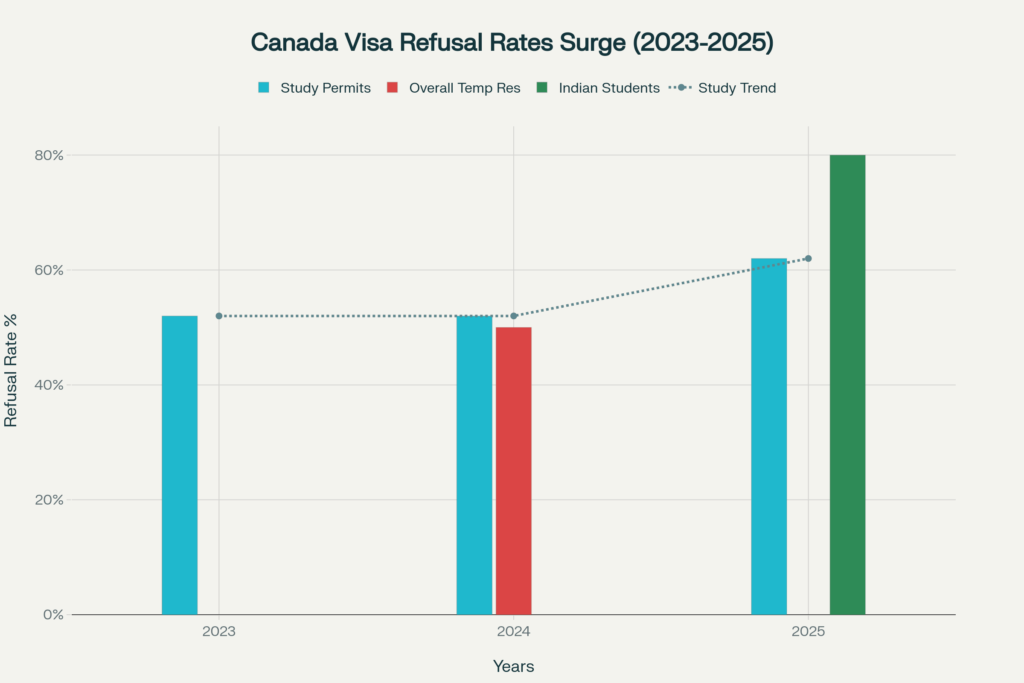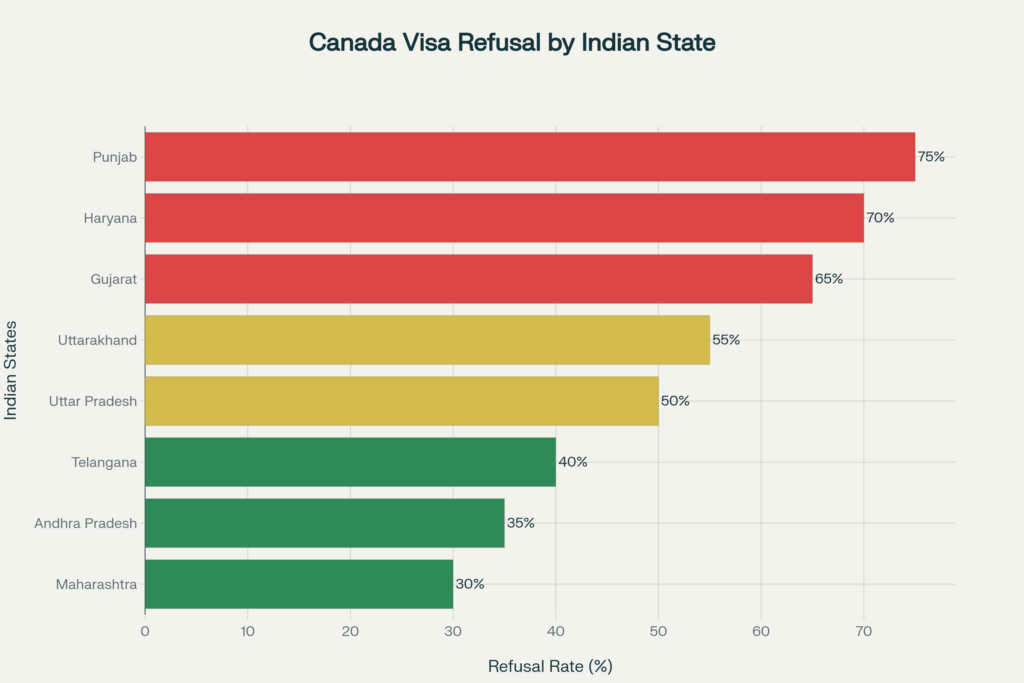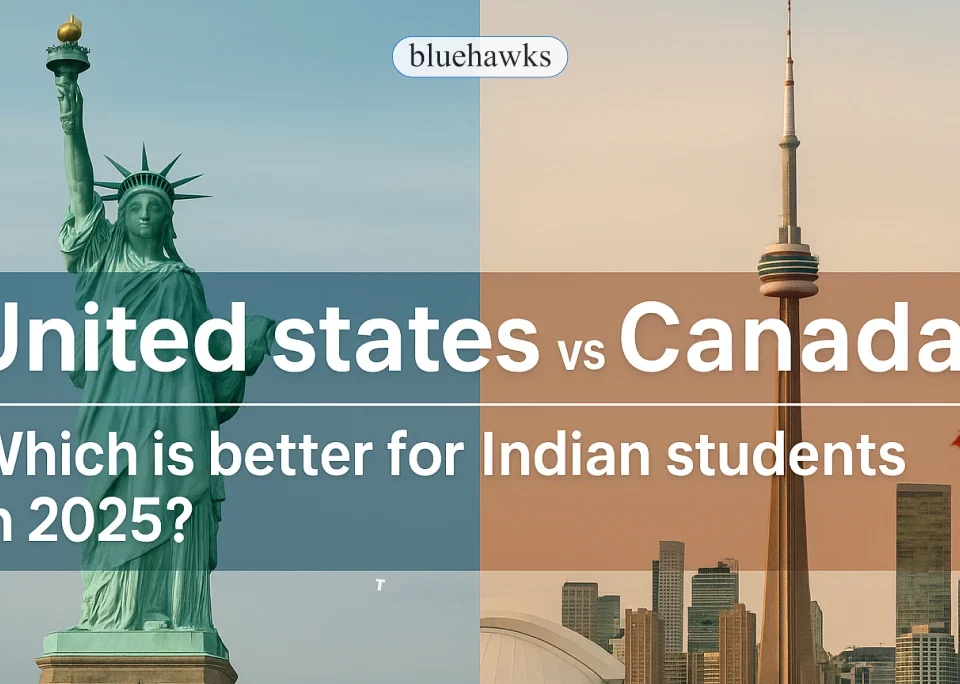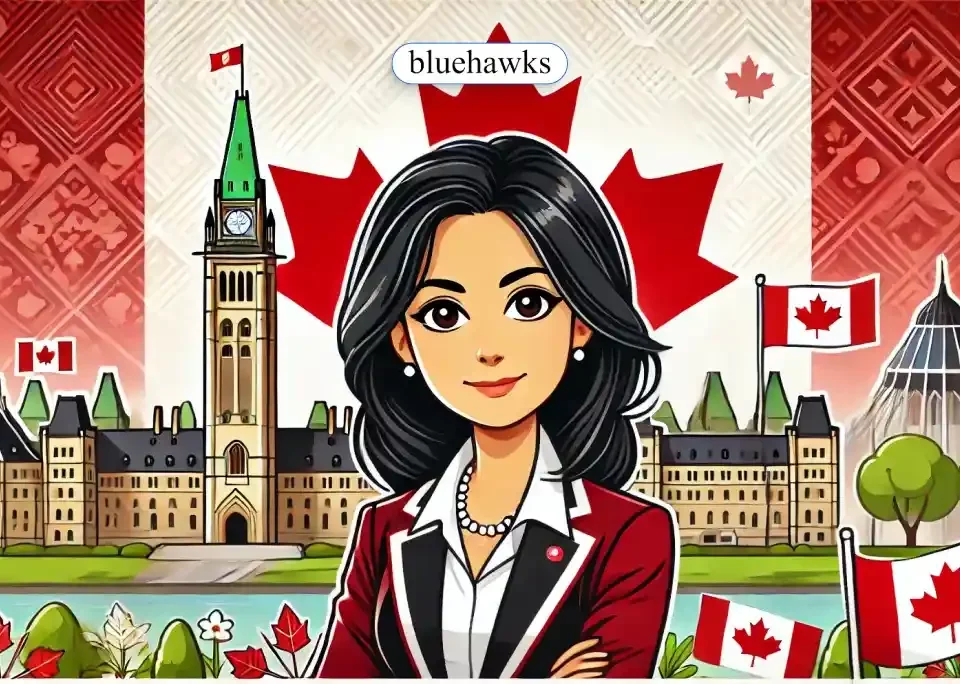Canada Study Visa Refusal: A Comprehensive Analysis

Estimated reading time: 15 minutes
The dream of studying in Canada has become increasingly challenging for international students, particularly those from India. If you’re facing a Canada study visa refusal or worry about potential rejection, you’re not alone. In 2025, Canada rejected a staggering 80% of Indian student visa applications, marking the highest refusal rate in over a decade. This comprehensive guide will help you understand the current landscape, identify key refusal patterns, and discover proven strategies to overcome Canada study visa refusal.

Table of contents
- Understanding the Current Canada Study Visa Refusal Statistics
- Global Impact of Canada Study Visa Refusal Trends
- State-Wise Canada Study Visa Refusal Patterns in India
- High-Risk States: Punjab, Haryana, and Gujarat
- Top Reasons for Canada Study Visa Refusal in 2025
- Common Myths and Stereotypes About Canada Study Visa Refusal
- How Students Successfully Navigate Canada Study Visa Refusal
- Why Bluehawks EduAbroad Excels in Overturning Canada Study Visa Refusal
- Taking Action After Canada Study Visa Refusal
Understanding the Current Canada Study Visa Refusal Statistics
The Canada study visa refusal landscape has undergone dramatic transformation in recent years. Overall study permit refusal rates climbed to 62% in 2025, up from 52% in 2024 and just 38% in 2023. This represents a complete reversal from the historically stable approval rates of around 60% that persisted for nearly a decade.
The numbers tell a sobering story. In 2024 alone, Canada rejected 2.3 million visa applications across all categories, with study permit refusals reaching 290,317 applications. The overall temporary resident application refusal rate hit 50% in 2024, affecting nearly half of the 4.7 million applications processed.
For Indian students, the situation has become particularly dire. While Indians comprised 40% of Canada’s international student population in 2024, they now face rejection rates as high as 80% in the second quarter of 2025. This dramatic shift has caused Germany to surpass Canada as the preferred destination for Indian students, capturing 31% preference compared to Canada’s declining 9%.
Global Impact of Canada Study Visa Refusal Trends
The restrictive policies have created ripple effects across the global education market. Canada’s approach contrasts sharply with competitor countries, where Australia maintains approximately 10-11% refusal rates, New Zealand 12-19%, and the UK around 12%. This positioning makes Canada currently one of the most challenging study destinations for visa approval.
The high refusal rates have disrupted international education flows, with students redistributing applications to countries offering more transparent criteria and higher approval certainty. The 2.6 million applications Canada rejected in 2024 represent not just statistical data but shattered dreams and significant financial losses for students and their families who invested in application fees, language tests, and educational assessments.
State-Wise Canada Study Visa Refusal Patterns in India
One of the most critical yet under-discussed aspects of Canada study visa refusal involves regional disparities across Indian states. Students from specific states face significantly higher scrutiny and rejection rates, creating an uneven playing field that many applicants don’t anticipate.

High-Risk States: Punjab, Haryana, and Gujarat
Punjab students face the most challenging environment for Canada study visa applications. Of approximately 2.25 lakh Indian students Canada accepted in 2023, 1.35 lakh were from Punjab. However, current patterns suggest these students now face rejection rates exceeding 70-80%.
The heightened scrutiny stems from documented fraud cases. In June 2023, 700 Indian students, predominantly from Punjab, nearly faced deportation due to fake admission letters. Immigration consultants report that “applicants from Punjab and Haryana are viewed with more scrutiny”, with officers particularly vigilant about IELTS score manipulation and document authenticity.
Haryana and Gujarat students similarly encounter elevated rejection rates. Consultants note that “usually, the IELTS scores are fudged or immigration consultants dupe people from these states”, creating systemic trust issues that affect even genuine applicants from these regions.
Moderate-Risk States: UP and Uttarakhand
Uttar Pradesh and Uttarakhand students experience varying scrutiny levels. Some Australian universities previously stopped processing applications from these states, citing ‘fake documents’ and high dropout rates. While specific Canada study visa refusal statistics for these states aren’t publicly available, the pattern suggests moderate-level challenges that require proactive documentation strategies.
Lower-Risk States: Southern India
Students from Andhra Pradesh, Telangana, and Maharashtra appear to face more favorable assessment conditions. Immigration experts suggest that “applicants from states like Andhra Pradesh, Telangana, and Maharashtra are viewed more favourably”. This regional advantage doesn’t guarantee approval but indicates statistically lower baseline scrutiny in officer assessments.
The state-wise disparity underscores the importance of understanding your regional risk profile when preparing Canada study visa applications and developing mitigation strategies accordingly.
Top Reasons for Canada Study Visa Refusal in 2025
Understanding why applications get rejected is crucial for developing effective strategies to overcome Canada study visa refusal. Immigration officers cite multiple grounds, with IRCC data showing an average of 2.6 reasons given for each refusal in 2024, increased from 2.1 reasons in 2022.
Reason 1: Doubt About Temporary Intent
The most prevalent Canada study visa refusal reason, appearing in over 75% of rejected cases in 2024, involves officers’ doubts about applicants’ intention to leave Canada after completing studies. Officers assess whether you genuinely plan to return to your home country or intend to use the study permit as an immigration pathway.
This evaluation, known as “dual intent” assessment, has become increasingly restrictive despite IRCC’s 2023 guidance clarifying that wanting to work in Canada after graduation shouldn’t conflict with study intentions. The contradiction creates confusion for applicants who must demonstrate both temporary study intent and career planning that may include Canadian work experience.
Officers evaluate temporary intent through multiple lenses: your family ties in Canada versus your home country, current employment and property ownership, and the logical connection between your studies and future prospects in India. Strong ties to your home country—including family responsibilities, property ownership, and established career paths—significantly strengthen your temporary intent demonstration.
Reason 2: Insufficient Financial Resources
Financial concerns constitute three of the five most common Canada study visa refusal grounds, reflecting heightened scrutiny following policy changes. In December 2023, Canada doubled the minimum financial requirement from CAD $10,000 to CAD $20,635. The current requirement stands at CAD $22,895 as of September 2025.
Officers scrutinize not just the amount but the source, consistency, and documentation quality of funds. Common financial issues triggering Canada study visa refusal include:
- Large, unexplained deposits appearing shortly before application
- Inconsistent banking patterns suggesting manufactured financial statements
- Inadequate proof of income sources for declared funds
- Missing documentation linking funds to legitimate sources
- Insufficient coverage for total education costs including tuition, living expenses, and contingencies
Providing 6-12 months of detailed bank statements showing consistent deposit patterns significantly strengthens financial credibility. Advanced applicants obtain Guaranteed Investment Certificates (GICs) even when not mandatory, demonstrating both financial capacity and commitment to Canadian financial systems.
Reason 3: Incomplete or Inaccurate Documentation
Incomplete or inaccurate documentation contributes to approximately 30% of Canada study visa refusals. Even unintentional errors can trigger serious consequences, potentially resulting in five-year reapplication bans under Section 40 of the Immigration and Refugee Protection Act.
Common documentation issues include:
- Missing certified translations for non-English documents
- Inconsistent academic records or unexplained gaps
- Incomplete employment history documentation
- Missing or improperly formatted letters of recommendation
- Inadequate explanation for educational or career gaps
- Improperly certified or outdated documents
Officers interpret missing information as either negligence or attempted misrepresentation. The difference between simple incompleteness and misrepresentation can determine whether you face temporary rejection or a five-year ban.
Reason 4: Course and Career Misalignment
Course-career misalignment represents a significant Canada study visa refusal trigger, particularly when applicants cannot justify their program choice relative to previous education or work experience. Officers assess whether your chosen program represents logical academic progression and genuine career development rather than immigration convenience.
Red flags include:
- Pursuing lower-level qualifications than previously obtained
- Switching fields without compelling justification
- Choosing programs unrelated to established career paths
- Selecting institutions or programs with questionable academic reputation
- Demonstrating unclear understanding of program content or career applications
Your Statement of Purpose must articulate clear, logical connections between your educational background, chosen program, and future career objectives in your home country.
Reason 5: Previous Immigration Violations or Misrepresentation
Previous visa refusals, overstays, or immigration violations in any country significantly complicate Canada study visa applications. Officers have access to international databases and view previous issues as indicators of future compliance risks.
Attempting to hide previous refusals or violations constitutes misrepresentation, which carries far more severe consequences than honest disclosure with proper explanation. If you have previous immigration history, addressing it proactively with context and evidence of changed circumstances improves approval chances compared to hoping officers won’t discover it.
Common Myths and Stereotypes About Canada Study Visa Refusal
The Canada study visa refusal market is plagued by misconceptions that mislead prospective students and contribute to application failures. Understanding and debunking these myths is crucial for making informed decisions.
Myth 1: “Canada Has Easy Visa Approval”
One of the most dangerous misconceptions suggests Canada maintains low refusal rates compared to other destinations. This belief, rooted in Canada’s historically welcoming immigration policies, no longer reflects current reality.
The truth: Canada’s 62% study permit refusal rate in 2025 significantly exceeds Australia (~10-11%), New Zealand (~12-19%), and the UK (12%), making it currently one of the most challenging study destinations globally. This myth particularly misleads students who assume their applications will face less scrutiny than other countries, leading to inadequate preparation and preventable Canada study visa refusal.
Myth 2: “You Can Get Visa on Arrival”
Some students believe they can obtain visas upon arrival in Canada, leading to poor planning and missed preparation timelines.
The truth: Canada does not provide on-arrival visas for any category, requiring standard processing periods of 3-6 weeks or longer. This myth creates unrealistic timelines that force rushed applications with incomplete documentation.
Myth 3: “Canadian Connections Guarantee Approval”
Many believe that family connections, particularly having relatives in Canada, automatically improve visa prospects.
The truth: While family sponsorship exists as a separate immigration stream, having relatives in Canada can actually increase scrutiny on temporary intent. Officers may view family connections as indicators of immigration intent rather than temporary study plans, potentially increasing Canada study visa refusal risk rather than helping your case.
Myth 4: “Previous Refusals Mean Permanent Bars”
Students who face initial Canada study visa refusal often believe they’re permanently disqualified or face insurmountable barriers to reapplication.
The truth: Previous refusals don’t create automatic bars unless misrepresentation is involved. With proper analysis of refusal reasons, comprehensive documentation improvements, and strategic reapplication planning, many students successfully overturn initial refusals. Bluehawks EduAbroad has helped hundreds of students overcome Canada study visa refusal in second attempts through systematic addressing of officer concerns.
Myth 5: “Hiring Any Consultant Guarantees Success”
Desperate students often believe that simply hiring a consultant will solve their Canada study visa refusal problems, regardless of the consultant’s expertise or approach.
The truth: The consultant market includes both legitimate professionals and fraudulent operators. Consultants themselves note that “about 30 percent of people who come to us have fake documents” from previous consultants. Success requires working with specialized experts who understand current policies, regional risk factors, and proven refusal reversal strategies—qualities that distinguish Bluehawks EduAbroad from traditional consultants.
How Students Successfully Navigate Canada Study Visa Refusal
Understanding successful navigation strategies helps you avoid common pitfalls and adopt approaches that maximize approval chances despite the challenging environment.
Strategy 1: Comprehensive Documentation Beyond Minimums
Successful applicants recognize that meeting minimum requirements no longer suffices in the current high-refusal environment. Strategic students provide 6-12 months of detailed bank statements showing consistent deposit patterns, extensive supporting evidence of family ties, property ownership documentation, and comprehensive career prospect evidence in India.
Advanced preparation includes obtaining Guaranteed Investment Certificates (GICs) even when not required and utilizing Student Direct Stream (SDS) applications, which historically show higher approval rates due to more rigorous upfront documentation requirements.
Strategy 2: GCMS Notes Analysis for Refusal Reversals
Students facing Canada study visa refusal increasingly request GCMS (Global Case Management System) notes to understand detailed officer reasoning beyond generic refusal letters. These notes provide specific concerns, evaluation criteria, and reasoning that informed the decision.
Students using GCMS insights to address specific concerns show significantly higher success rates in subsequent applications compared to those making superficial changes without understanding root issues. This data-driven approach transforms reapplications from hopeful resubmissions into strategically targeted responses to documented concerns.
Strategy 3: Professional RCIC Consultation
The complex Canada study visa refusal landscape drives increased reliance on Regulated Canadian Immigration Consultant (RCIC) assistance for application review and strategy development. However, not all consultants deliver equal value.
Successful students seek consultants who:
- Demonstrate current policy knowledge and statistical awareness
- Provide state-specific risk assessment and mitigation strategies
- Offer comprehensive documentation review rather than template-based services
- Show proven track records of Canada study visa refusal reversals
- Maintain RCIC accreditation and ethical practices
Bluehawks EduAbroad distinguishes itself through specialization in refusal reversals, data-driven strategy development, and proven success with hundreds of students who overcame initial rejections.
Strategy 4: Alternative Destination Planning
Practical students develop backup strategies recognizing Canada’s high refusal environment. Germany’s emergence as the preferred destination for 31% of Indian students in 2024 reflects this strategic diversification trend.
Countries like New Zealand, Australia, and various European nations benefit from Canada’s policy tightening as students redistribute applications. Parallel applications to multiple countries increase overall costs but provide crucial backup options when primary choices face high refusal probabilities.
Strategy 5: Strategic Institution Selection
Students increasingly prioritize Designated Learning Institution (DLI) selection based on approval rate patterns and institutional compliance history rather than purely academic preferences. Researching institutional relationships with immigration authorities and historical approval rates for specific programs improves application success probabilities.
Coordinating with university international offices ensures proper documentation and compliance with evolving requirements such as Provincial Attestation Letters (PAL), helping navigate the complex interplay between educational acceptance and immigration approval.
Why Bluehawks EduAbroad Excels in Overturning Canada Study Visa Refusal
In an increasingly challenging environment where 80% of Indian student applications face rejection, choosing the right consultant can mean the difference between continued Canada study visa refusal and successful approval. Bluehawks EduAbroad has established itself as the premier choice for students navigating this difficult landscape.
Data-Driven Approach to Refusal Analysis
Unlike traditional consultants relying on generic templates and outdated strategies, Bluehawks EduAbroad employs comprehensive refusal pattern analysis that considers current statistical trends, state-specific risk factors, and evolving officer assessment criteria. We track the 80% Indian student refusal rate, the 62% overall refusal rate, and regional scrutiny patterns affecting Punjab, Haryana, and Gujarat students.
Our methodology incorporates real-time policy awareness, including the increased financial thresholds (CAD $22,895 as of September 2025), Provincial Attestation Letter (PAL) requirements, and modified dual-intent assessment criteria. This contemporary knowledge base ensures your application addresses current officer concerns rather than historical requirements.
Proven Success Record: Hundreds of Refusals Overturned
Bluehawks EduAbroad has successfully helped hundreds of students overturn their Canada study visa refusal in second attempts, achieving success rates significantly exceeding industry averages. Our systematic approach addresses each of the 2.6 average refusal reasons cited per application through comprehensive documentation enhancement and strategic reapplication planning.
Unlike traditional consultants who simply resubmit applications with minor modifications, we conduct thorough GCMS notes analysis to understand precise officer concerns and develop targeted responses addressing specific institutional and individual risk factors. This methodology has proven particularly effective in converting initial refusals into approvals for high-risk state applicants who face heightened baseline scrutiny.
State-Specific Mitigation Strategies
Traditional consultants often overlook the regional bias patterns affecting students from certain Indian states. Bluehawks EduAbroad develops customized state-specific mitigation strategies that proactively address heightened scrutiny based on your regional profile.
For Punjab, Haryana, and Gujarat students facing the most challenging environment, we implement enhanced documentation protocols, additional verification mechanisms, and strategic positioning that distinguishes genuine applicants from the fraudulent cases that created regional stereotypes. This targeted approach recognizes that one-size-fits-all solutions are inadequate when rejection reasons vary significantly based on applicant demographics and regional perceptions.
Comprehensive Support Beyond Visa Applications
While traditional consultants focus narrowly on application submission, Bluehawks EduAbroad provides holistic support encompassing financial planning, university selection optimization, and long-term career strategy alignment. We recognize that successful visa applications require authentic narratives supported by genuine academic and career progression plans.
We assist students in developing convincing temporary intent demonstrations that satisfy current officer concerns while maintaining authentic long-term career objectives. This dual approach addresses the 75% of refusals citing temporary intent concerns through strategic positioning rather than misrepresentation, which carries severe penalties including five-year bans.
Innovation in Documentation Excellence
Bluehawks EduAbroad utilizes advanced documentation strategies that exceed standard requirements and proactively address common Canada study visa refusal triggers. Our methodology includes:
- Comprehensive financial narrative development showing legitimate fund sources and consistent banking patterns
- Academic progression justification demonstrating logical course selection and career alignment
- Career pathway demonstration linking studies to concrete opportunities in India
- Personalized Statement of Purpose development addressing specific risk factors while highlighting unique strengths
- Complete documentation review ensuring all materials meet current officer expectations
Unlike traditional consultants relying on template SOPs and standardized documentation, we develop individualized application narratives that transform routine submissions into compelling cases for approval.
Specialized Expertise in Current Policy Environment
Traditional consultants often lag behind policy changes, continuing to use strategies inappropriate for the current restrictive environment. Bluehawks EduAbroad maintains cutting-edge awareness of the evolving regulatory landscape that has seen refusal rates surge from historical 40% levels to current 62% overall and 80% for Indian students.
We understand that successful applications in 2025 require fundamentally different approaches than those effective in previous years when approval rates exceeded 60%. Our contemporary strategy frameworks acknowledge current realities rather than relying on historical success patterns that no longer apply in the dramatically transformed approval landscape.
Ethical Practice and Transparency
In a market where consultants report that “about 30 percent of people who come to us have fake documents” from previous advisors, Bluehawks EduAbroad maintains strict ethical standards. We use AI and advanced technologies to help students overcome document fraud, score manipulation, or misrepresentation risks—ensuring every application is genuine, transparent, and protected from strategies that create short-term approvals but long-term dangers like deportation or permanent bans.
Our commitment to ethical practice means we sometimes deliver difficult truths about approval probabilities rather than false promises. This honesty, combined with proven strategies for legitimate application strengthening, creates sustainable success rather than risky shortcuts that endanger your future immigration prospects.
Taking Action After Canada Study Visa Refusal
If you’ve faced Canada study visa refusal or worry about potential rejection, taking strategic action now can dramatically improve your prospects. The current environment demands sophisticated approaches that go beyond generic application templates.
Bluehawks EduAbroad stands ready to help you navigate this challenging landscape. Our proven track record of overturning hundreds of Canada study visa refusals, combined with cutting-edge policy awareness and state-specific strategies, positions us as your ideal partner in transforming rejection into approval.
Don’t let Canada study visa refusal end your international education dreams. Contact Bluehawks EduAbroad today to discover how our specialized expertise can help you join the hundreds of students we’ve successfully guided from refusal to approval. Your Canadian education journey doesn’t end with rejection—it begins with the right strategic partner.
💬 Chat with our 24/7 chat support team, just tap on that WhatsApp button on the right bottom of your screen 👉



